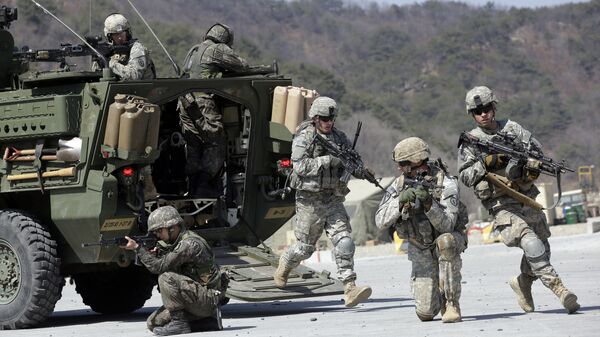South Korea's Foreign Ministry announced Tuesday that Washington and Seoul’s negotiations on the shared costs of hosting some 28,500 US military service members in South Korea were placed on the backburner over the US’ alleged demand for $5 billion in stationing costs.
“The US believes that the share of defense spending should be increased significantly by creating a new category” outside of Special Measures Agreement framework the two countries have used for decades, the foreign ministry statement said, according to The Japan Times.
The reported $5 billion fee would be a staggering increase from the previous year’s $923 million bill footed by Seoul. US officials have yet to confirm $5 billion was the total demanded.
“It is true that there is a substantial difference between the US side’s overall proposal and the principles we pursue,” South Korean negotiator Jeong Eun Bo said during a news conference, as reported by Reuters. “The talks could not proceed as planned as the US side left first.”
The outlet reported that James DeHart, a negotiator for the US Department of State, argued at a press briefing following the breakdown that proposals “put forward by the Korean negotiating team were not responsive to our request for fair and equitable burden sharing.”
However, he also claimed the US walked away from the negotiating table to give South Korea “time to reconsider.”
US Defense Secretary Mark Esper, who was in the Philippines earlier this week, echoed his similar, previous comments on South Korea’s wealth as he discussed negotiations that he clarified were being led by the US State Department.
"I'm sure it's in capable hands," he said, reported Reuters. "South Korea is a wealthy country. They can and should contribute more. And beyond that I will leave it to the State Department to work out the particulars."
Though Esper has warned about the benefits China and North Korea may reap from the fracture in relations between South Korea and Japan, it appears Beijing is also stepping up to the table in areas Washington is making difficult.
Amid the halted negotiations with the US, South Korea has been able to make strides in bolstering its “bilateral exchanges and cooperation in defense” with China during the sidelines of regional security talks in Bangkok, Thailand, according to Seoul’s Ministry of National Defense, reported The Daily Telegraph. As part of the agreement, Beijing and Seoul will reportedly set up more military hotlines, and South Korean Minister of Defense Jeong Kyeong Doo is expected to visit China in 2020.
This breakdown in talks with Seoul is not the only trouble for the US on the Korean Peninsula. North Korean leader Kim Jong Un also recently responded to US President Donald Trump’s admonishing of Pyongyang over their “rabid dog” comments on former Vice President Joe Biden and chided the planned US-North Korea summits as “useless” events that “President Trump touts as his achievements.”
Mr. Chairman, Joe Biden may be Sleepy and Very Slow, but he is not a “rabid dog.” He is actually somewhat better than that, but I am the only one who can get you where you have to be. You should act quickly, get the deal done. See you soon! https://t.co/kO2k14lTf7
— Donald J. Trump (@realDonaldTrump) November 17, 2019
“If the US does not really want to let go of its dialogue with us, it should make a decision to withdraw its hostile policy of viewing us as an enemy,” Kim said on Monday.
He added that North Korea is “not interested in such useless talks anymore. We will not give anything to the US president to brag about when we have received nothing in return.”




